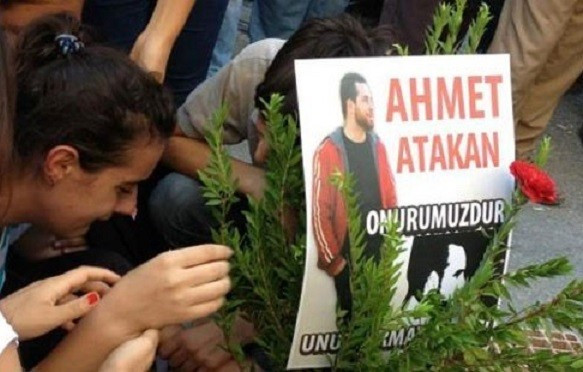Turkey Crackdown on Alawites Pushes Erdogan's AKP Government Closer to Police State [BLOG]
Suspicious death of protester Ahmet Atakan in Antakya another sign of brutalisation, says Uzay Bulut

Addressing police academy graduates at a ceremony in Ankara in June, prime minister Tayyip Erdoğan said that police had displayed "legendary heroism" in quelling weeks of anti-government protests.
Three months later and despite the condemnation of international community and governments, those "legendary heroes" have caused the death of another protester - 23-year-old Ahmet Atakan in Antakya. Witnesses said that the police also attacked those waiting outside the hospital where he had been taken and injured two people.
Residents of Antakya had been holding demonstrations for weeks to commemorate those who were killed during the Gezi Park protests in Istanbul. During one sit-in, the police attacked and Atakan lost his life. Initial medical reports said that he was struck on the head by a teargas canister.
As the debates over his death continue and before the autopsy results have been released, Muammer Güler, minister of the interior, said: "There was no police intervention involved in the protester's death."
Police released footage taken at the scene, which they said showed Atakan falling from a building. His family said the police had a role in their son's killing.
Ahmet's brother, Süleyman Atakan, said that the way he fell suggested that he had been hit by the teargas canister.
"The way he fell shows that he was unconscious while falling. He fell like a sack. One should normally make the effort to move but he did not," his uncle Nevzat Atakan said.
The town of Armutlu in Antakya, where Abdullah Cömert, Ali Korkmaz and Ahmet Atakan, who lost their lives during demonstrations, came from, is probably the place that has been affected the worst by the discriminatory policies of Erdogan's AKP government.
The town has been under police blockade since the Gezi demonstrations started. There are regular clashes which are provoked by police, according to residents who spoke to Ulaş Gürşat of Birgün newspaper.
On one night alone, 350 teargas canisters were collected from the streets by residents. Those canisters were thrown at protesters over two hours, witnesses said.
The people of Armutlu think that the AKP government discriminates against them because the town has a large Alawi, or Alawite, population.
"It is not only the government, but the governor's office, the police, and all administrative bodies that discriminate against us. Even the electricity distribution corporation treats us differently," a shopkeeper who did not give his name said.
"I can't think of any other explanation when they cut off our electricity while the rest of the city has it. People of all faiths live in harmony here but the government exposes us to discrimination. Even if we call an ambulance, they won't send it."
Atakan's death has started a new wave of demonstrations in Turkey's biggest cities in the past few days. And three months after the Gezi Park protests, the police are still resorting to the same disproportionate violence.
Security forces used 130,000 canisters of teargas against Gezi Park demonstrators over 15 days, resulting in injuries and deaths.
"It is clear that the police did not learn any lessons from their appalling handling of the Occupy Gezi protests. This unacceptable violence has been encouraged by the complete impunity enjoyed by those responsible for the abuses from May to July," Reporters Without Borders said.
Turkey, according to the Human Rights Association, has become a police state.
"A country where the police protect the government and the government protects the police is called a police state" it said.
As government officials and Erdoğan cry over the deaths in Syria and Egypt, they call people tortured and killed during demonstrations in their own country "terrorists" with the implication that they deserved to be killed.
Instead of launching full and impartial investigations and punishing the perpetrators, AKP officials go on denying police brutality.
"The deaths during the Gezi Park protests are a drop in a bucket when compared with the deaths in Syria," Egemen Bağış, minister for EU affairs and chief negotiator of Turkey with the European Union, said.
As if all that violence were not sufficient, the police will now be able to use electroshock guns if needed, news agencies reported.
"Using electroshock guns means that [the] torture which hundreds of thousands of people in this country have been exposed to will be committed in the streets," Metin Bakkalcı, secretary general of the Human Rights Foundation of Turkey, said.
Police repression, including the use of lethal weapons, is a growing force as the government, with arrogance and contempt, escalates the war against its own people.
Uzay Bulut is a freelance journalist based in Ankara
© Copyright IBTimes 2025. All rights reserved.





















